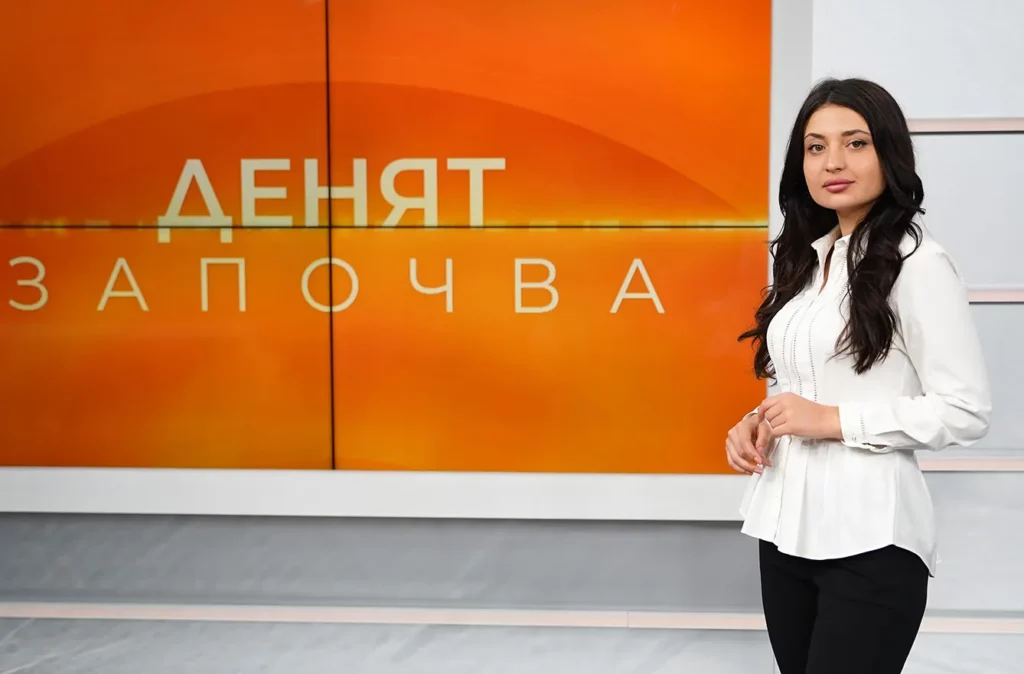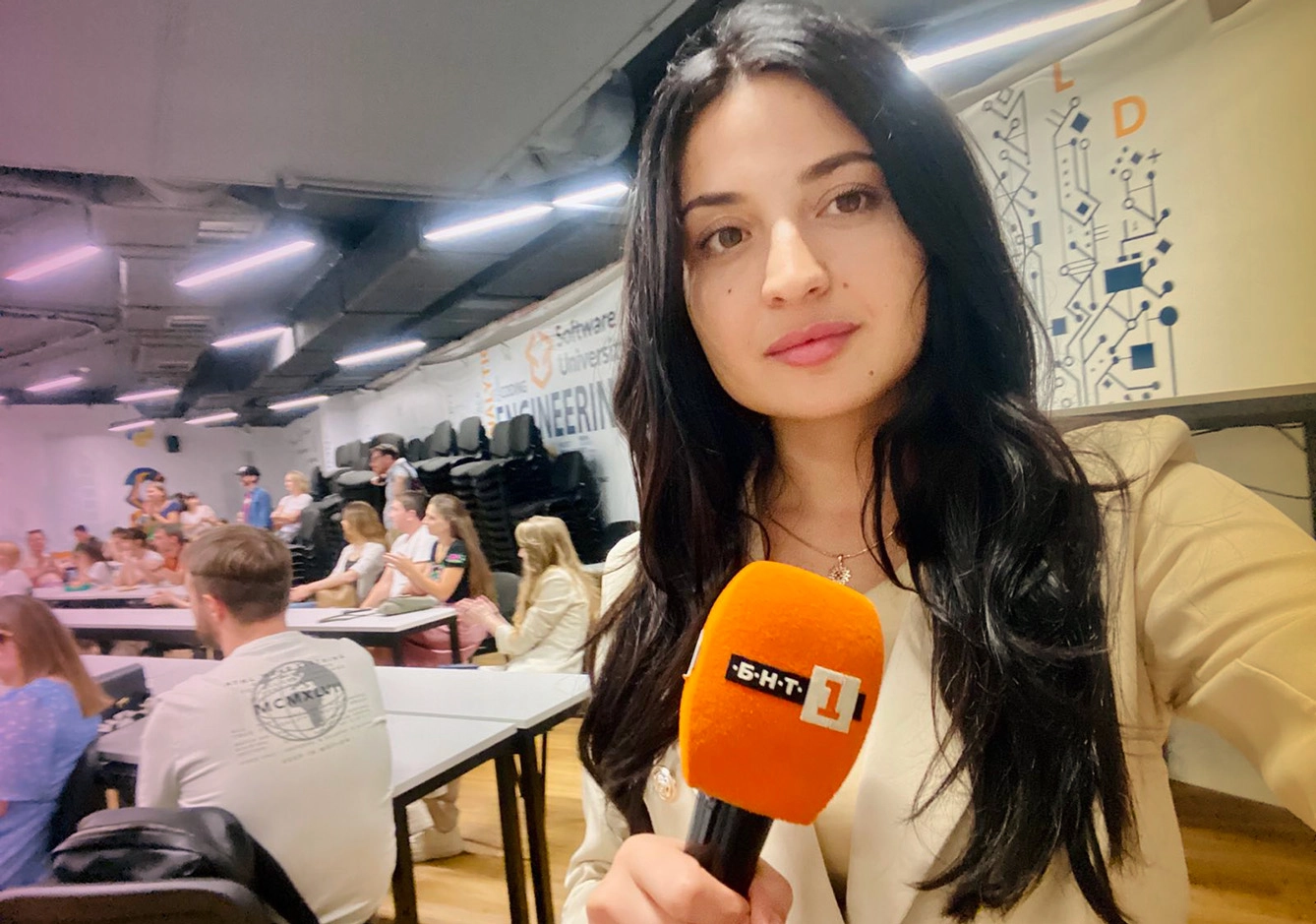Born in a Bulgarian village in the Odesa region of Ukraine, Maria Plachkova is part of the team on the morning program “The Day Begins” on Bulgarian National Television. Before arriving in Bulgaria shortly after the beginning of the outbreak of war in her home country, Maria Plachkova hosted a show about the life of Bulgarians in Ukraine on Odesa TV.
GG: Ukraine is among the three largest countries in Europe, but many people do not know about the ethnic diversity of the country. Tell us about this mosaic of people we collectively call Ukrainians.
MP: Ukrainian people- these are citizens of Ukraine from all nationalities, and they are 134 of them, with the state language being Ukrainian. The main population is Ukrainians, comprising about 80% of our society. But Ukraine is also home to Armenians, Jews, Belarusians, Russians, Crimean Tatars, Moldovans, Bulgarians, Hungarians, Romanians, Poles, and Greeks, to name just some of the bigger groups in the country. The list goes on and on. We are all equal; there is no division by nationality. And more than ever, we see this now, during the war, when the message coming out of Ukraine is, “Here’s a land inhabited by united and strong people.”

GG: The Bulgarian minority in Ukraine is a rather sizeable one. How did it come to be?
MP: The resettlement of Bulgarians in Ukraine began in the 18th century during the Russo-Turkish war. The Bulgarian community in Ukraine today numbers about 250,000 people. Most of them live in the Odessa region and call themselves Bessarabian Bulgarians. In the east of the country, near the Sea of Azov, there’s another group of Bulgarians, known as Tavria Bulgarians, after the region they live in.
For two centuries, Bulgarians in Ukraine have managed to preserve their language, traditions, and culture. However, only after the collapse of the Soviet Union in the 1990s, already in independent Ukraine, the work of organizing a proper Bulgarian life, mostly through cultural societies, began for good. It was at that time that the Bulgarian language could be learned in schools across the country. Growing up in such an environment, I came to see Ukraine as a country allowing the various nationalities comprising it to be who they are, offering support along the way.
GG: What is happening to those Bulgarian communities now?
MP: When the full-scale Russian aggression against Ukraine began in 2022, part of the territories with a compact Bulgarian population were occupied by the Russian army. In the occupied parts of the Zaporizhzhia region, the occupation authorities banned the study of the Bulgarian language and closed Bulgarian Sunday schools and centers.
GG: As a Ukrainian citizen of Bulgarian origin observing the last year from Bulgaria, what worries you today? And where do you find reasons for optimism?
MP: I enjoy ordinary things. I now appreciate something as simple as someone asking me, “Hello, how are you?” I was very worried when Russia was bombing Ukraine’s power system and there was no electricity. For a few days, I couldn’t contact my relatives by phone. I didn’t know if my parents were okay. I would send them messages without knowing if they ever saw them. It was terrible. But I managed to buy a generator in Bulgaria and sent it to them.
GG: What were your first impressions coming to Bulgaria? What difficulties did you encounter?
MP:
You know, it was difficult for me to leave Ukraine. I left on 30 March 2022, a little over a month after the start of the war. One week later, I started working at Bulgarian National Television. I have no reasons to complain. My new colleagues were very helpful, too. I found a lot of support. I want to note that there are very good and helpful people in Bulgaria who sympathize with Ukraine. I thank them for that.
But on a personal level, one year later, in the safety of Bulgaria, it is still very difficult for me to process all that. It is difficult to see how Russia is leveling entire cities and killing thousands of innocent people. It is hard to read news about your friends and colleagues dying. It is just incredibly difficult…
GG: How does your work as a reporter at Bulgarian National Television (BNT) help you connect Bulgaria and Ukraine?
MP: In Odesa, I studied Ukrainian-Bulgarian philology. As a journalist in Ukraine, I was in charge of a TV program dedicated to Bulgarian life in Ukraine. After an internship at BNT, I’m back in a similar but reversed role: I’m now telling stories about Ukraine to a Bulgarian audience. On a personal level, it is very important for me to inform ordinary Bulgarians about everything happening in Ukraine, which is not so far away from Bulgaria’s northern border.
GG: Besides peace, what else do you wish for Ukraine?
MP: Of course, most of all, I want peace and victory for Ukraine. I want my people to live and work in peace, to create families with children who are not deprived of their childhood. I also want Ukraine to recover its cities, its infrastructure, so we can see its citizens coming back to their homes. I hope that we’ll see all this happening sooner than later. I wish we could all witness Ukraine becoming a free, developed country with strong and happy people.







